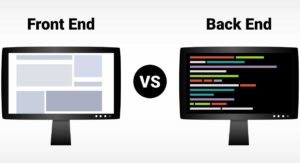Java is one of the older programming languages, dating back to 1995. And it’s still running strong as the #1 programming language of choice for developers.
If you’re interested in this career and curious to know how the job of a Java developer looks, this guide is for you. Read on as we discuss Java Developer job descriptions, showing what employers in the field are looking for and what a typical Java developer job demands.
Carving a successful Java career requires an appetite for continuous learning. Whether through a full stack developer course or a coding bootcamp, you must keep your skills sharpened and be ready to soak up new industry knowledge.
Who is a Java Developer?
A developer responsible for developing Java-based applications is a Java developer. Java’s popularity lies in its speed, security, reliability, and how it lends itself to various applications across various platforms. As such, Java developers are hired to build web and mobile apps, custom software, iOS and Andriod games, as well as cloud apps, AI and ML applications, and IoT devices.
A Day in the Life of a Java Developer
The job of a Java developer is exciting, challenging, and rewarding in equal measure. As a developer, you will create, test, and maintain applications and software using Java.
Because of Java’s versatility, you might handle projects of diverse nature – from simple mobile applications to more complex development work.
Your core tasks will involve writing, debugging, and testing code using various tools and frameworks. You’ll also use databases, web servers, web services, APIs, etc., to integrate applications with other systems or platforms. This job also involves research and learning new technologies or frameworks. Continuous improvement and learning are a part of the job.
But Java development is not just about coding. It is a highly collaborative work. Therefore, you’ll work closely with other developers and engineers to integrate Java solutions into websites, business software, and diverse device applications. The project lifecycle might also include designers, testers, and analysts, with whom you must collaborate on changes, updates, delivery, and feedback.
Communicating with stakeholders is also a major part of working in a Java development team. So, you’ll regularly use collaboration tools, like Slack, GitHub, Jira, etc., to coordinate your work and share your ideas and feedback.
You wrap up by completing tasks, updating status reports, committing code changes, and resolving any issues or bugs.
Also Read: The Latest Buzz on Full Stack Developer Salaries
Java Developer Job Description
Now that we’ve seen an average Java development job, let’s dive into more specifics. In this section, we’ll highlight the qualities and skills a company looks for when hiring a Java developer.
The Java developer job descriptions below outline the roles and expectations for experienced Java developers and those entering the field.
Beginner Java Developer Job Description
- Focus on potential, enthusiasm, and willingness to learn rather than extensive technical skills.
- Responsibilities include creating dynamic web pages and designing user interfaces using HTML and frameworks.
- Developing Java applications and conducting thorough testing to ensure functionality.
- Active participation in code review activities to maintain code quality.
- Opportunity to gain experience in web frameworks and server systems.
- Ideal role to launch a promising career in the dynamic Java development field.
Experienced Java Developer Job Description
- Analyzing user requirements and translating them into efficient Java code.
- Enhancing and improving functionalities throughout the software development lifecycle.
- Executing multiple tasks to ensure the smooth operation of complex applications.
- Collaborating with cross-functional teams to define, design, and develop innovative software features.
- Crafting comprehensive documentation for database architecture and various developmental phases.
As these two JDs show, there is a significant difference in the nature of the job as you progress. Your willingness to learn the tricks of the trade helps you scale heights.
Also Read: What Does a Coder Do? A Beginner’s Guide
Java Developer Job Roles
As a Java developer, you can take on various specialized roles in the software development industry, depending on your expertise and interests. Here are some of the top ones:
- Full Stack Java Developer: Full-stack developers work on both the frontend and back-end of web applications, utilizing Java and other technologies.
- Enterprise Java Developer: These developers specialize in creating complex and scalable Java-based applications for large or multinational companies.
- Java Web Developer: Their focus is developing dynamic web applications using Java, including building and maintaining web services.
- Java Software Engineer: These engineers work on software design, architecture, and development, often in larger development teams.
- Java Game Developer: Game developers use Java to create interactive and engaging games for various platforms.
- Java Mobile Developer: Mobile developers use Java to develop applications for Android devices, utilizing the Android SDK.
- Java Backend Developer: Backend developers focus on server-side development and managing databases, APIs, and server logic.
- Java DevOps Engineer: DevOps engineers use Java to automate deployment processes, manage infrastructure, and ensure the continuous integration and delivery of software.
- Java Architect: Java Architects design high-level structures for software projects, making strategic decisions about technology and development methodologies.
- Java Cloud Developer: Cloud developers specialize in deploying and managing Java-based applications in cloud environments like AWS, Azure, or Google Cloud.
These roles can vary in their specific requirements and responsibilities. This shows the diverse range of career paths within the software development field.
Java Developer Skills & Qualifications
The skills to be a good Java developer can be diverse. It takes constant learning and an adaptable mindset to stay on top of the game in this dynamic environment.
Let’s look at the essential skills you will find in Java developer job descriptions and postings.
- Java Language Proficiency: Demonstrating a solid grasp of the language and its ecosystems is key.
- Object-oriented Programming (OOP): The ability to effectively apply OOP patterns and concepts.
- Design and Architectural Patterns: Familiarity with various design and architectural patterns.
- Reusable Java Libraries: Developing reusable Java libraries to streamline coding.
- Concurrency Patterns: Understanding Java’s concurrency patterns for efficient multithreading.
- MVC & JDBC: Grasping MVC (Model-View-Controller) and JDBC (Java Database Connectivity) concepts.
- Web Frameworks: Experience with popular web application frameworks like Play and Spark.
- GUI Frameworks: Knowledge of Java GUI frameworks such as Swing, SWT, and AWT, per project needs.
- Clean, Readable Code: Ability to write clean, readable Java code for maintainability.
- Class Loading Mechanism: Understanding Java’s class loading mechanism.
- Database Handling: Experience in handling external and embedded databases.
- Scalable Application Design: Knowing basic design principles for scalable applications.
- Database Schemas: Skill in creating database schemas that support business processes.
- JVM Knowledge: Understanding Java Virtual Machine (JVM), its limitations, and workarounds.
- Testing & Version Control: Implementing automated testing platforms, unit tests, and version control tools like Git.
- Build Tools: Familiarity with tools like Ant, Maven, Gradle, and continuous integration.
Java Developer should be familiar with these tools as well:
- JavaServer Pages (JSP) and Servlets
- Web Frameworks: Such as Struts and Spring
- Service-Oriented Architecture
- Web Technologies: HTML, JavaScript, CSS, JQuery
- Markup Languages: XML, JSON
- Abstract Classes and Interfaces
- Constructors, Lists, Maps, Sets
- File I/O and Serialization
- Exception Handling
- Generics
- Java Keywords: These include static, volatile, synchronized, transient, etc.
- Multithreading and Synchronization
Also Read: An Ultimate Guide to Full Stack Developer Skills
Educational Qualification of a Java Developer
Java developers come from various educational backgrounds. Preferred qualifications include a Bachelor’s or Master’s in Computer Science, Computer Engineering, or related fields.
However, practical hands-on experience can help secure a job, especially in Java development. You could come from an unrelated field, but your skills in Java can prove to be your ticket.
For experienced full-stack Java Developers seeking career growth, consider pursuing a full stack developer program to expand your skill set. It will open up more opportunities for you.
Java Developer Career Map
A career as a Java Developer offers a world of possibilities in the IT industry. Whether you’re a seasoned pro or just starting, you will be surprised by the different paths you can take to scale heights. Here is one possible career path.
Starting Point: Junior Developer
- If your Java knowledge is in its early stages, begin as a junior developer.
- Gain valuable experience and build your skills by working in IT.
Foundation Building: Java Certification
- Strengthen your foundation by pursuing Java certification training courses online
- Enhance your proficiency in the most widely used programming language
Exploring New Horizons: Middleware and Beyond
- Consider venturing into middleware technologies and other programming languages to diversify your career
- Get certified from a top university via good courses and coding bootcamps
The Future of Java Programming
Java is here to stay and holds a bright future in the world of programming. After nearly three decades in the industry, Java continues to thrive. The TIOBE index also ranks Java as the world’s most popular programming language.

Therefore, it is a highly logical choice if you are considering starting a career as a Java programmer in 2023.
Java’s adaptability allows it to integrate seamlessly with tech advancements and industry trends. Its extensive usage spans web and mobile app development and cutting-edge technologies like big data, IoT, blockchain, and AI. This confirms that Java will play a significant role in programming for many more years.
What Certificates Can Add Value to Your Career as a Java Developer
Certificates can be a game-changer for Java developers. It can add great value to your career journey. These certificates validate your skills and the roles and responsibilities you can take up in this field.
There are several avenues for Java developers to enhance their careers. It can be through certificate programs, comprehensive training programs, or even bootcamps. These programs focus on both the theoretical and practical aspects.
If you are wondering why you should invest in a program you can earn a certificate from, here’s why:
- It enhances your job prospects by making you a more attractive candidate to potential employers
- Shows your commitment to continuous learning and professional development in the Java ecosystem
- Certified Java developers often command higher salaries, leading to better job opportunities and earning potential
- A better and structured learning path ensures you comprehensively understand Java, including its latest features
- It helps you stay up-to-date with industry best practices and emerging trends in Java development
As you can see, the benefits of formal training are numerous. Therefore, we highly recommend you consider taking this step, whether you’re aspiring to become a Java developer or planning to take your career to the next level.
Also Read: Cloud Engineer Job Description: Here’s Everything You Need to Know
Become a Java Developer
Now that you know the career path of a Java developer and what it takes to be one, it’s time to take the leap. You could join a full stack developer program if you want to apply your Java skills to both front-end and back-end projects. A coding course is ideal for a fundamental understanding of the industry.
Taught by industry experts, these programs cover key concepts and arm you with the necessary skills. Balancing your learning with work commitments is easy with live virtual classes and self-paced learning. Through practical training and hands-on projects, you can build an enviable portfolio. Plus, at the end of the course, you get a certificate of completion to boost your resume
Ready to start a lucrative career in Java development? Enroll today!
FAQs
- What is the Java developer job description?
Java developers design, develop, and maintain Java-based applications, collaborate with teams, and ensure software quality.
- What are the essential skills for a Java developer?
Java proficiency, OOP knowledge, web frameworks, MVC, JDBC, RESTful services, Git, and CI skills are essential.
- Which role is best for a Java developer?
Roles like Full-Stack Developer, Back-end Developer, or Software Engineer align with Java development skills; choice depends on interests.
- Is a coding bootcamp useful if I want to become a Java developer?
Of course! A well-designed bootcamp from a reputed institute is perfect for those looking to break into the development industry, whether you’re a beginner or an experienced tech professional seeking new career opportunities. It can easily be your gateway to a promising coding and development career.
You might also like to read:
Cybersecurity Job Description: A Complete Guide
A DevOps Engineer Job Description for Aspiring Professionals
A Data Scientist Job Description: The Roles and Responsibilities in 2023






